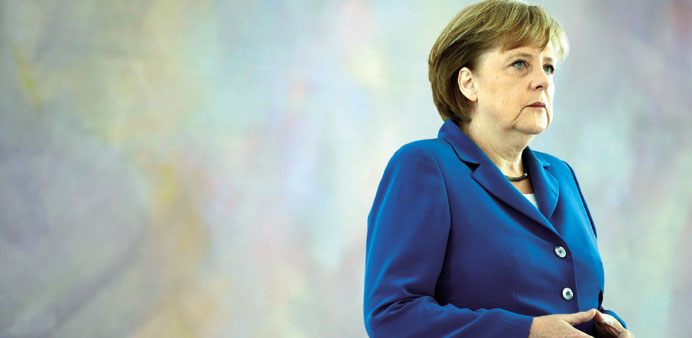German Chancell Angela Merkel: her policies have certainly had a global impact and their effects will no doubt live on in the next generation - just perhaps not quite in the way she might have intended.
By Nina dos Santos/CNN/ London
As Europe’s most powerful state approaches its general elections, the German chancellor may well be pondering her legacy.
And in many ways Angela Merkel has achieved the ultimate accolade.
Her policies have certainly had a global impact and their effects will no doubt live on in the next generation - just perhaps not quite in the way she might have intended.
For, in towns and cities across the eurozone, a staggering number of young people are joining the jobless line.
Europe has always had a history of high unemployment- even during the good times. Yet the latest set of statistics makes for grim reading.
In March, almost a quarter of the bloc’s under 25-year-olds were without work. That’s twice the overall rate for the region and a figure so worrying it prompted the International Labour Organisation to warn of deep scarring to the area’s social fabric.
“It’s not just a quantitative issue,’’ says Moazam Mahmood, the ILO’s director of economics and labour markets.
“It’s a qualitative one as well. If people can’t find a job at the start, they will take longer to find one and their wages will be lower,” he says.
Thus the irony is: despite trying to teach her southern neighbours the benefits of hard work through fiscal discipline, Merkel has actually robbed its youth of their first taste of the rewards a job can bring.
Addressing both ends of the age spectrum at the annual symposium of Switzerland’s prestigious St Gallen University, Larry Fink, chairman and CEO of asset manager Blackrock, summed up Europe’s labour issues in a nutshell.
“The problem is we’ve had so many cuts, so quick, in the public sector without a thought of how the private sector can create jobs for these people,’’ he remarked.
For business leaders like Fink, governments the world over have missed a trick by failing to create tax and other incentives for companies to hire the people during the downturn.
The ILO also recommends that, while jobs are scarce, both government and industry invest in training and apprenticeships; thus helping to break the cycle of discouragement and depression among those young people unable to find meaningful employment.
“It takes two hands to clap,” says Mahmood.
“We need education, youth and employment guarantee schemes backed by governments.”
Of course such plans require cold, hard cash, which no longer flows freely in Europe’s periphery these days.
In Greece, where youth unemployment has breached an appalling 60%, the spectre of both civil unrest and a devastating brain drain remains a constant threat.
One Greek-born tycoon, who made his fortune after emigrating in the 1960s, told me how he spent two days marooned in Athens’ top Grande Bretagne Hotel during last summer’s riots, missing meetings and fearing for his safety.
“It was as if it wasn’t the same country,” he said.
“It’s hard to say it but the best thing I could have done was to leave when I was young and that was already many years ago,” he sighs.
For Konstantinos Michalos, president of the city’s chambers of commerce, even once the unemployment rate starts to abate enticing those who left back to their country of origin won’t be easy.
“There has always been an outflow towards northern Europe over the last 30-40 years, but now both skilled and unskilled workers are starting to leave,” he says.
“And once they go, it’s difficult to get them back over a short period of time.”
Greece is not alone in dealing with what the IMF chief has branded “a lost generation”; almost two thirds of Spain’s young workforce is standing idle as well.
And yet these countries highlight another other unfortunate coincidence.
For ask Michalos where Greece’s young workers are headed and his reply is quick.
“To Germany,” he says.
And at once both Europe’s vicious cycle and Merkel’s lasting legacy become clear.
* Nina dos Santos, a London-based news anchor and correspondent, is the host of CNN International’s twice-daily global business show World Business Today and regularly presents various feature shows including CNN Marketplace Europe and the Outlook series.

